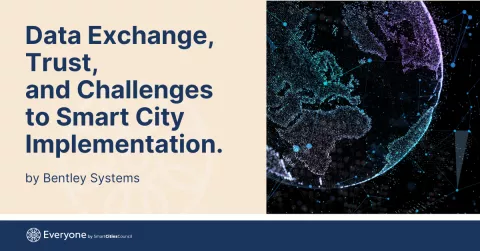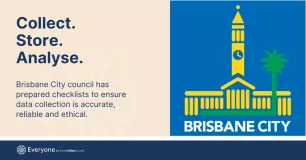
What we understand as the concept of smart cities has been around for over 40 years. However, it has gained momentum over the past few years, with the potential to revolutionise the way we live and work in urban areas. Through the integration of digital twins, Internet of Things (IoT) devices, artificial intelligence (AI), and big data, smart city technology seeks to improve urban infrastructure, enhance public safety, and promote a more sustainable environment. However, the implementation of these technologies is not without challenges, particularly when it comes to facilitating data exchange between various entities. In this article, we will delve into the difficulties surrounding data exchange and examine how these challenges may impact the successful rollout and longevity of smart city technology.
Standardisation
The lack of standardisation and interoperability is a pressing issue in enabling seamless data exchange between different entities. As diverse organisations and entities employ various data formats, systems, and protocols, integrating and exchanging this data becomes a complex and daunting task. To effectively implement smart city technology, there must be a concerted effort towards standardising data formats and protocols, which will pave the way for seamless data exchange and integration across multiple platforms.
Data Usage Transparency
Additionally, the proliferation of IoT devices and the vast amount of data generated by smart city technology raises significant concerns about data privacy and security. It is a critical challenge for stakeholders to ensure that the data collected from citizens and devices is kept secure and only used for its intended purposes. Governments and organisations need to implement robust data protection measures—including encryption, access controls, and data anonymisation—to address these concerns and build public trust in smart city technology.
Navigating the complexities of data ownership and establishing data sharing agreements can be a contentious and complicated process. As various entities contribute to and benefit from smart city data, defining ownership and access rights becomes crucial to the success of these projects. It is essential to establish clear and transparent data sharing agreements that outline the responsibilities and rights of each party, fostering cooperation, facilitating data exchange, and ensuring that all stakeholders benefit fairly from the shared information.
Connectivity
Another challenge faced by smart city initiatives is the need for reliable, high-speed connectivity to support real-time data collection and processing. Many urban areas still grapple with network infrastructure and connectivity issues, making it difficult to accommodate the massive amounts of data generated by smart city technology. Ensuring that there is sufficient bandwidth and coverage across urban environments will be crucial for successfully implementing of these innovative solutions.
Regulatory Framework
Furthermore, the rapid development of smart city technology has outpaced existing legal and regulatory frameworks, leading to ambiguity and uncertainty. Policymakers must develop comprehensive regulations that address the unique challenges posed by smart city technology, such as data privacy, security, and ownership. These regulations should provide clear guidance for stakeholders while ensuring that innovation and development are not stifled. By striking the right balance between regulation and innovation, policymakers can help pave the way for the successful implementation of smart city technology.
Considering these challenges, it becomes clear that fostering trust among stakeholders plays a critical role in overcoming the hurdles associated with data exchange and driving the successful implementation of smart city technology.
The Impact of Trust on Smart City Technology Adoption
The widespread adoption of smart city technology is contingent on the trust of citizens, as their willingness to accept and engage with these innovative systems is directly influenced by their confidence in the technology’s dependability, security, and benefits. Trust plays a pivotal role in determining the success of smart city initiatives, as citizens are more inclined to embrace technologies that they perceive as valuable and reliable. Consequently, it is crucial to integrate trust-building measures into developing and deploying smart city technology to ensure ultimate success.
To cultivate trust in smart city technology, it is essential to provide a transparent disclosure of its functionality, objectives, and potential benefits. Public education about the technology, and involving citizens in decision-making processes, can play a significant role in fostering trust. A well-informed citizenry that understands the purpose and advantages of smart city initiatives is more likely to support and engage with such systems, thereby strengthening community bonds.
Data privacy and security concerns are among the most pressing issues for citizens when it comes to smart city technology. Research indicates that individuals are more trusting of, and likely to engage with, systems that implement robust data protection measures. By ensuring secure storage, ethical usage, and adherence to intended purposes for collected data, trust among citizens can be fostered, encouraging their participation and creating a safer community.
Moreover, confidence in the government and other entities responsible for implementing the technology is vital for public acceptance. Citizens must believe that these organisations prioritise their best interests and have the expertise to manage the complexities of smart city technology. Promoting trust can be achieved through transparent decision-making, open communication, and active public engagement in rollout. This transparency can help bridge the gap between citizens and the organisations driving smart city initiatives, ultimately benefiting the entire community.
Successful smart city technology implementation requires collaboration among a diverse array of stakeholders, including government agencies, private companies, and community organisations. Trust among these parties is essential for fostering cooperation and enabling data exchange, which is crucial to the seamless integration of smart city technologies. Establishing clear, transparent data-sharing agreements and cultivating a culture of trust and collaboration will be instrumental in building partnerships that drive success and contribute to thriving, resilient communities.
Integrating trust-building measures into the development and deployment of smart city technology is crucial for its widespread adoption and ultimate success. By addressing trust issues related to technology, data handling, governance, and stakeholder collaboration, smart city initiatives can gain public support and contribute to the creation of more resilient and sustainable urban environments. The key to unlocking the full potential of smart cities lies in fostering trust among all parties involved, creating a solid foundation for the future of urban living and fostering stronger, more connected communities.
The successful implementation and adoption of smart city technology hinges on addressing the challenges surrounding data exchange and fostering trust amongst stakeholders. By tackling issues—such as standardisation, data privacy and security, data ownership, infrastructure, legal frameworks, and trust-building measures—smart city initiatives can overcome these obstacles and unlock the transformative potential of these innovative solutions. As we navigate the complexities of integrating smart city technology into urban environments, it is crucial to maintain a forward-thinking and collaborative approach that emphasises the importance of trust and cooperation.
Ultimately, the key to creating thriving, resilient, and sustainable smart cities lies in our ability to effectively address these challenges and foster trust among citizens, governments, and organisations. By working together and embracing transparency, collaboration, and innovation, we can usher in a new era of urban living that benefits both citizens and the environment.
Submitted by Bentley Systems team members Jenny Tran and Matt Gijselman
Jenny Tran is an enterprsise success manager at Bentley Systems, helping users to realize the full potential of Bentley’s software solutions.
Matt Gijselman is a director of public policy and advocacy at Bentley Systems.



